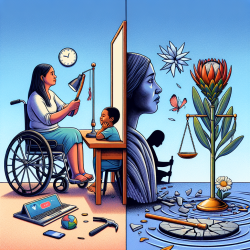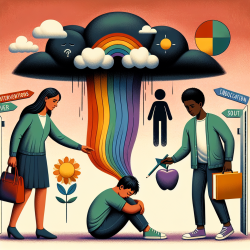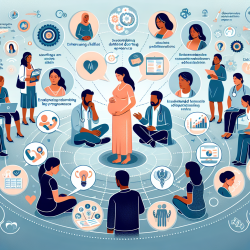Introduction
In the realm of speech-language pathology and online therapy services, practitioners are increasingly called upon to address the multifaceted challenges faced by children and their families. One such challenge is the intersection of disability and intimate partner violence (IPV), a topic explored in the research article titled “It is in the Nature of Men”: The Normalization of Non-Consensual Sex and Intimate Partner Violence Against Women with Acquired Physical Disabilities in South Africa. This study highlights critical insights that can inform practitioners' approaches to support vulnerable populations effectively.
Key Findings from the Research
The study employs a cross-sectional, qualitative methodology to explore the experiences of South African women with physical disabilities who have encountered IPV. The findings reveal that disability intersects with gender norms, exacerbating vulnerability to abuse. The research identifies several risk factors for violence, including dependency on others, poverty, and societal attitudes towards disability.
Importantly, the study underscores the normalization of violence within relationships, with many women internalizing societal beliefs that violence is a natural component of intimate partnerships. This normalization can lead to underreporting and acceptance of abusive behaviors as inevitable.
Implications for Practitioners
For practitioners in the field of speech-language pathology and online therapy, these findings offer valuable insights into how they can better support children and families affected by IPV and disability. Here are some key takeaways:
- Awareness and Education: Practitioners should be aware of the heightened vulnerability of individuals with disabilities to IPV. Educating themselves and their clients about the signs of abuse and the importance of seeking help is crucial.
- Creating Safe Spaces: Establishing a safe and supportive environment for clients to discuss their experiences without fear of judgment or retaliation is essential. Practitioners should foster open communication and trust.
- Collaboration with Other Professionals: Working collaboratively with social workers, psychologists, and other professionals can provide a holistic approach to addressing the needs of individuals facing IPV and disability.
- Advocacy and Policy Change: Practitioners can advocate for policy changes that address the systemic issues contributing to IPV and disability-related violence. This includes promoting access to resources and support services.
Encouraging Further Research
While this study provides valuable insights, it also highlights the need for further research in this area. Practitioners are encouraged to engage in research initiatives that explore the intersection of disability and IPV in different contexts. By contributing to the body of knowledge, practitioners can help develop more effective interventions and support systems for those affected by these issues.
Conclusion
Understanding the complex interplay between disability and IPV is crucial for practitioners working with vulnerable populations. By implementing the insights from this research, practitioners can enhance their ability to support children and families effectively. To read the original research paper, please follow this link: “It is in the Nature of Men”: The Normalization of Non-Consensual Sex and Intimate Partner Violence Against Women with Acquired Physical Disabilities in South Africa.










